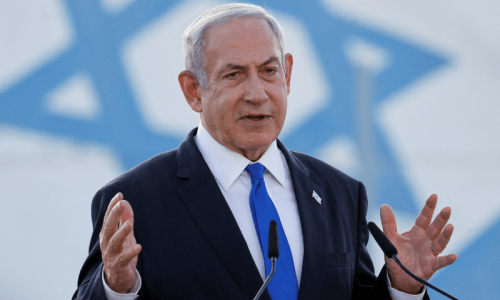GAZA CITY: Hamas on Thursday accused Israeli Prime Minister Benjamin Netanyahu of “procrastinating” on negotiations for the second phase of a fragile ceasefire in Gaza, after Palestinian authorities returned the bodies of four deceased prisoners to Israel.
“The second phase negotiations have not practically begun, and we are ready to engage in them as stipulated in the agreement,” Hamas spokesman Abdul Latif Al-Qanou said in a statement, adding that “Netanyahu is procrastinating regarding the second phase”.
The ceremony to return the bodies of Shiri Bibas, her two young boys — Kfir and Ariel — and a fourth prisoner, Oded Lifshitz, 83 at the time of his capture, took place at a former cemetery in the southern Gaza city of Khan Yunis.
Authorities in Gaza Strip hand over bodies of
Israeli prisoners killed after an air strike
Hamas said an Israeli air strike killed the Bibas family early in the war but Israel has never confirmed the claim.
Hamas and its armed wing “did everything in their power to protect the prisoners (hostages) and preserve their lives, but the barbaric and continuous bombing by the occupation prevented them from being able to save all”, the fighters said in a statement.
Israel and Hamas announced a deal earlier this week for the return of eight hostages’ remains in two groups this week and next, as well as the release of six living Israeli captives on Saturday.
Palestinian prisoners are also to be freed in Saturday’s swap but were not part of Thursday’s handover. The a ceasefire in Gaza has held despite accusations of violations on both sides.
It has also been under strain from US President Donald Trump’s widely condemned idea to take control of rubble-strewn Gaza and relocate its population of more than two million Palestinians.
Ahead of the handover, Hamas and members of other armed Palestinian groups brought four black coffins on a stage erected on the sandy patch of ground. A banner behind them depicted Netanyahu as a blood-stained vampire.
Each casket bore a small photo of the deceased. White mock-up missiles nearby carried the message: “They were killed by USA bombs,” a reference to Israel’s top military supplier.
Under a cold drizzle, a fighter with his face wrapped in a red and white keffiyeh scarf sat on the stage to complete documents with a Red Cross official. The coffins were loaded into Red Cross vehicles. Buildings bombed during more than 15 months of war surrounded the site.






